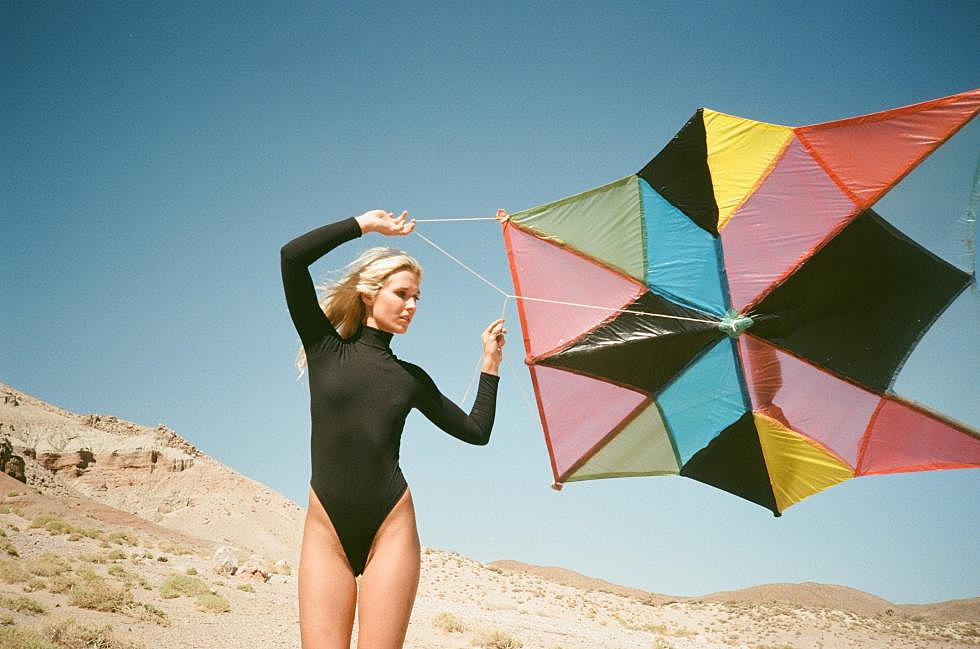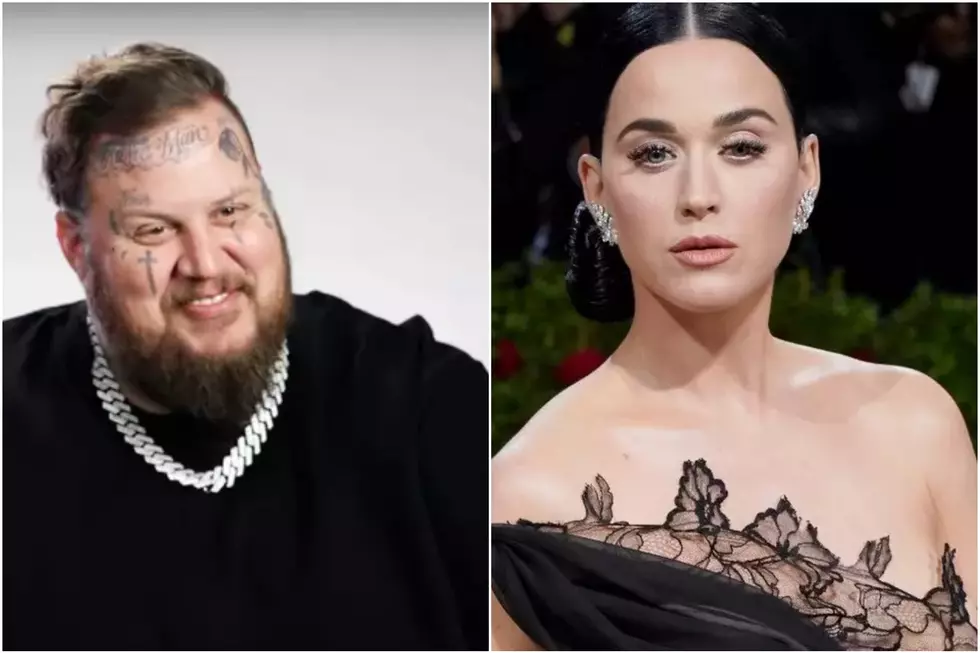
Interview: How Love, Loss and Jay Joyce Led firekid to Create ‘Muscle Shoals Metaphysical’
Muscle Shoals Metaphysical is the second full-length release by firekid from Muscle Shoals, Ala. It had been six years since the release of their debut, and it wasn’t always certain that they would return to music. Dillon Hodges, who created the project, had experienced tremendous personal loss and chose to step away from his art. When he was introduced to Heidi Feek a couple of years later, their bond through loss led them to a bond in music that grew to give her agency over their shared artistic vision.
Hodges had moved to Nashville for a few years before he and Feek returned to Muscle Shoals. When they arrived to visit his family, she fell in love with the area. It’s a place that had invested a lot into Hodges as a child, and the pair's shared love of the area eventually led them to buy a home and put down roots.
“The town inspired this record,” Hodges said. “I feel like coming back here was the catalyst for making this record, along with working with Jay Joyce.”
Joyce produced the album. The Grammy-winner previously produced albums for Eric Church, Patty Griffin, The Wallflowers, Cage the Elephant, Carrie Underwood, Brothers Osborne and Miranda Lambert among others. While Hodges and Feek have long worked on modernizing classic styles of music, Joyce has added a rock flair to country.
Hodges and Feek spoke to The Boot about bonding over loss, learning how to create music together and what supporting this record during the ongoing COVID-19 pandemic may look like in 2022.
Did you step away from music for a while?
Dillon Hodges: Yes. We put out a four-track EP in 2018 [XY], which was a re-release of “Boomerang,” a song from our first record. We decided since we were going to do it, we’d put out a couple of other songs, as well. But that wasn’t a proper release, so it’s been since 2015. That was six years ago.
I basically quit music because I got separated from my wife at the time and she then died. I knew Heidi already, but we began making music together. She had lost her mother at that time, and we were going through similar things. That was around 2017. It was really a time where we stepped back and tried to figure out what life is about. Is it worth pursuing more ephemeral pleasures or desires that I have for some sort of success in an industry that I had stopped believing in?
I also tried to make a second record with Michael Angelakos from Passion Pit. We almost finished it, but we sort of fell out of touch. I had been burned and we had both experienced personal loss. It wasn’t until we put out that re-release that we were toying with making music again, and in the end, we still weren’t thinking about doing it that seriously until our producer Jay Joyce reached out to me and we met with him. He made us feel like our music was something that needed to be out there and that we didn’t need to stop making music.
This record was the first that you created together. What was it like working with DIllon in a professional setting?
Heidi Feek: I make jokes about it. I feel like it’s a common feeling to get older and turn into your parents, and I definitely saw my parents work together. So it feels natural with Dillon. We’re just doing what we do anyway, but we’re doing it together. And it’s really fun. It’s really special that the person I have chosen to spend my life and time with will get to experience all of the highs and lows of this project with me. We’re pretty invested in each other’s lives.
DH: We spend all of our time together anyway. We’re not apart that often, so it just seemed like the most natural thing in the world to work together. It was just something that naturally happened. Coming from where Heidi comes from, where her parents were a literal country music duo, it made sense for us. It just kind of happened.
HF: We’re at a place where Dillon has spent a lot of time figuring out who he is as a person and as a musician, and I’ve done the same. We know who we are individually and we’ve been able to figure out who we are together as a band. This record is a really good example of that.
The sound that Dillon was already creating is one of the most unique sounds ever. And I’m sure that when you walked into that, you had your own style. How did those styles mesh? Did you have to mold yourself into what he was already doing or was it natural?
HF: Dillon and I met because some people that I had played music with told me that I had to meet firekid. What I was doing was classic country with modern production behind it. And Dillon was doing that with bluegrass. Someone set us up in a co-write and we immediately hit it off musically. He spoke the same language that I did.
DH: We were both trying to modernize classic styles of music. It was the most natural thing in the world to work together. Because we both had dreams of bringing music that we loved into a new era and to a new audience.
In what way did returning to the Muscle Shoals area inspire the record?
DH: In the most obvious ways. We wrote with John Paul White some, although only one of the tracks he wrote made the record. We wrote it here at our house. The difference between firekid and Muscle Shoals Metaphysical, in my opinion, is the emphasis on groove.
On the first record, it’s more four-on-the-floor, 120 BPM songs; this is all slower grooves, more in the 90s BPM-wise. That’s more of a nod to Roger Hawkins [drummer of Muscle Shoals Rhythm Section] and the more breakbeat funky grooves of the town that I grew up in. That’s mixed with the Appalachian tradition of bluegrass. My first guitar teacher was one of the first people I reached out to when I got back to town and we regularly get together and pick again, playing those old bluegrass tunes.
It’s a mixture of the funk and the Black music of this town with the country, hillbilly, bluegrass traditions of the area. Combining all of that together – it’s surprising to me that no one else has done it.
Did Heidi’s presence facilitate the sound that you were going for?
DH: I don’t know that she was the driving force behind making it funky, but her vocal style – she sings more legato, more of a crooner – but it was her idea to bring the soulful identity of the town into this record.
We were inspired how 90s hip-hop used music from the “Muscle Shoals era.” The breakbeats become the looped background to create new things on top of. We didn’t use breakbeats, but we took that style and used it as the building blocks.
HF: We definitely used breakbeats for all of the demos. I think what I bring to firekid besides being an artist and singing, is that I like writing songs. That’s where I come from–the Music Row side of Nashville. I do play all of the percussive elements live, though.
You mentioned writing sessions with John Paul White. Did you write with anyone else on this one?
HF: Our producer set up a couple of writing sessions because he knows anybody and everybody. He did a good job of filtering in some people that he knew we would mesh well with. We worked with Jedd Hughes. We wrote a song with The Warren Brothers. We worked with James Slater, who is a family friend. And one of our closest friends, Willie Breeding, who we worked on the EP with, wrote some of these songs. He played on a few tracks, as well.
DH: It’s an interesting mix of Music Row, classic country songwriters that we wrote with, like the Warren Brothers and James Slater. And then people that had a foot in that world but found success outside of it, like John Paul White. And then people that come from just totally different traditions of indie rock like Jedd and Willie. It was an interesting mix of songwriters. The glue that brought all of that together was Heidi. Jay and I were more of the musical backbone.
Obviously you haven’t been on the road. Are there plans to try to return when you’re able?
DH: I both miss playing shows and also don’t miss them at the same time. We’ve toyed with the idea of doing some theater shows. We might do a couple of one-offs. What we’ve been doing instead of doing shows has been streaming on Twitch. It’s not a traditional show where we just sit and play songs.
HF: Unless we’re in the mood. We do that sometimes, if we want.
DH: Yeah. But we sit and talk to our community online.
HF: We do a lot of gardening.
DH: We do gardening. We score silent films live. We’ll play firekid songs. We did an hour-long Christmas special where I played 15 Christmas songs on a Game Boy. It can be anything, and I think I prefer playing shows from home in many ways. I may be the only person in the world saying this. I do like sleeping in my own bed and being able to use my own bathroom. But even so, we’ll probably do a couple of shows next year, depending on how COVID is doing.
AMERICANA RADIO'S MOST PLAYED ALBUMS OF 2021
More From TheBoot


![Firekid’s New Song ‘Backwoods’ Is a Trippy Blend of Bluegrass and Electronica [Exclusive Premiere]](http://townsquare.media/site/623/files/2021/08/attachment-firekid-backwoods.jpg?w=980&q=75)






